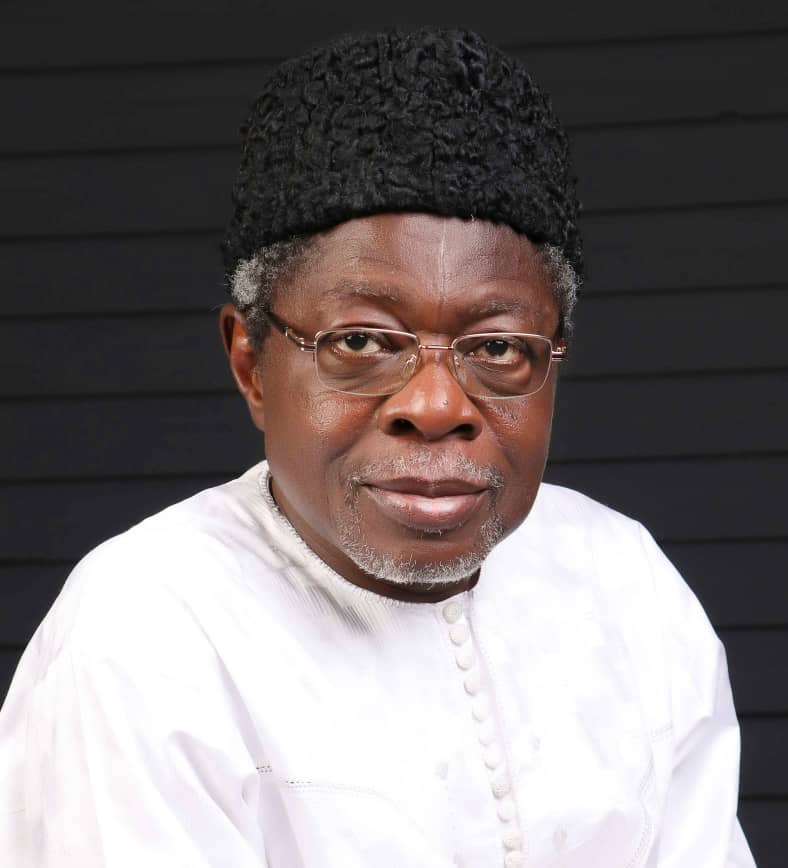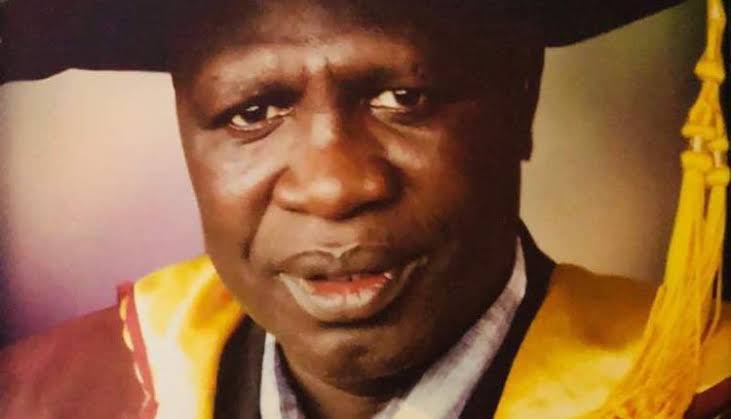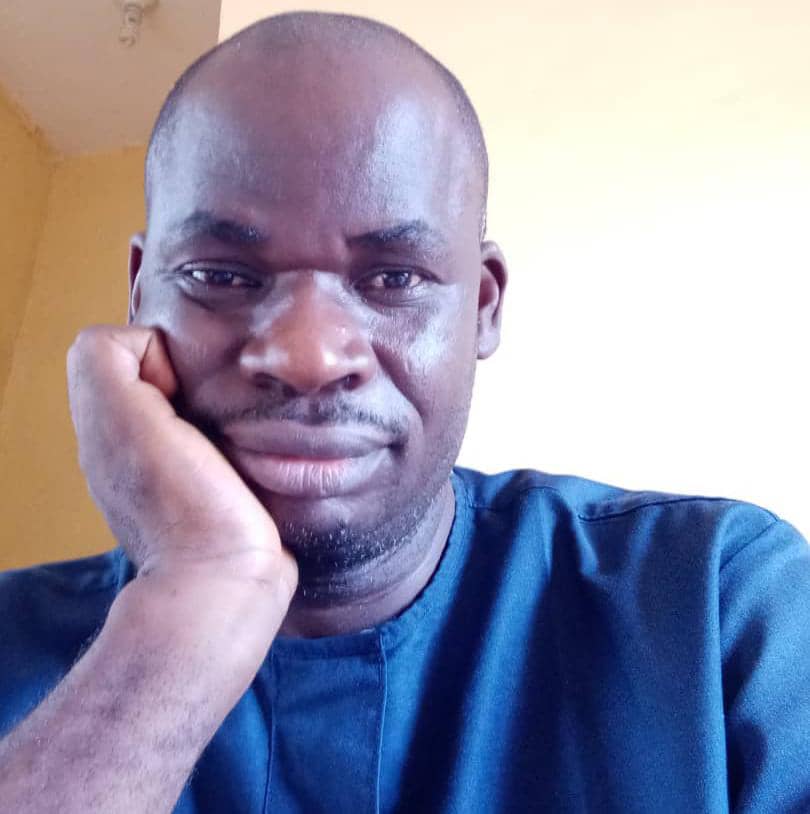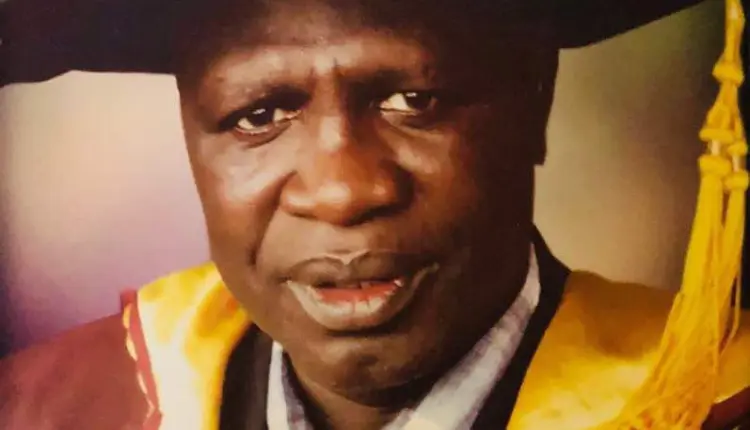Column
Change Must Begin With The Leader, By Hassan Gimba

Change Must Begin With The Leader, By Hassan Gimba
This writing was first published on 6 July 2020. With changes of leadership soon at the federal and state levels, I see it as relevant. The first part in particular. However, do we forget the lessons in the second part?
The world is changed by your example not by your opinion – Paulo Coelho, Brazilian Lyricist and author of The Alchemist.
Allah (SWT) said in the Qur’an that He does not change the condition of a people until they change what is in their hearts. It is a verse widely quoted out of context by people wanting to give their idols in power excuses. There was never a time in any history when people just woke up and all of them at the same time said to themselves: “We must change”. Even revolutions and mass uprisings have guides. Someone had to mobilise them, sensitise them, and lead the way. And that person is called a leader. Therefore, those who are fond of quoting this verse as an excuse to shield their principals are either loose-brained or plain mischievous. Most likely, they won’t refer to the verse if the icon does not appeal to their sentiments.
RELATED STORY: Fallacies Of Religion, No-Man’s-Land, And Why Nigeria…
Because God raises the living out of the dead and brings forth light out of the dark, He raises from among a people their type who leads them from deprivation to well-being. Out of the palace of the Pharaoh, He raised Moses (AS). Out of the family and society of idolaters, He brought forth Abraham (AS), and out of the heathendom of Arabia, He revealed Muhammad (SAW).
Chaka the Zulu founded the Zulu Empire and for twelve years before his assassination on September 22, 1828, he molded his people into a dominating fighting force never seen before in southern Africa. Mao Zedong, known as Chairman Mao, was the founding father of The People’s Republic of China and laid the foundation of what China now is. You can go on and count leaders who changed their people and their countries’ fortunes by leading by example. Cuba’s Fidel Castro was one; we also had Muammar Gaddafi from Libya, Dr Martin Luther King who raised the consciousness of Blacks, Dr Muhammad Mahathir of Malaysia and Mahatma Gandhi of India.
These leaders raised the consciousness level of their people and changed them to better human beings, by being what they wanted their people to be. They did not look at their people in the face condescendingly and patronisingly, point a finger at them, and sing “change” while they indulged in the vices of yore. Mao viewed such leaders as “swollen in head, weak in legs, sharp in tongue but empty in belly.”
In Nigeria, they promised us “change” and we fought to bring in its champions. Some lost their capital, others their health, while some paid the supreme price, but we all heaved a sigh of relief and proclaimed, “It has come!” We wanted change, and we thought fairness and justice would take the place of selfishness and impunity; that transparency and accountability would replace corruption but, above all, that our lives and property would be secure.
We have seen how our leaders of old discarded our homemade cars, foods, clothes, hospitals and schools and embraced those of foreigners for themselves and their families. We were witnesses to our leaders collecting stupendous salaries and allowances, while our most vulnerable slept on empty stomachs. We thought the change would bring leaders who would put everything for the wealth of the land to cascade to the least of us.
Sheikh Usman Dan Fodio had two lamps, one bought by the state and the other from his salary. After finishing state work with a state lamp in the night, he blew it out and lit the personal one for his private work.
So, what has changed? Anyone who tells me I must first change before my nation changes is not fair to me. He is just mocking me. People are just a crowd. They need a leader to become a nation. I just need to be led out of the woods and that was why I voted. A crowd cannot change anything, except to cause chaos and anarchy, but a leader can.
We can attest to this even from simple clothing. Many of us wear our watches on the right because we grew up watching General Yakubu Gowon do so. Before the coming of Alhaji Shehu Shagari as president, many typical northerner’s gowns (Babbar Riga) had a “just there” embroidery, but Shagari came with the Shagari style – full embroidery covering the chest down to the stomach. Now, you may be called a clown if you wore a gown with small embroidery. Nigerian men, especially those from the north, used four yards for their jumpers and trousers. Then General Sani Abacha, like a bolt from the sky, came with his tazarce and redefined how we dress. Wear a four-yard jumper now and risk being viewed as “half-naked”. President Buhari too has brought back a hitherto dead mode of dressing – wearing a collar-neck shirt under a caftan.
At the state level, a state I know very well is Yobe. When Bukar Abba Ibrahim was the governor, his followers took to wearing his type of red dara cap. This mimicking of leaders is seen in the way many admirers of the current governor, Mai Mala Buni, are adopting his idiosyncrasies and a certain cap he has popularized.
Did we not see how General Obasanjo’s Operation Feed the Nation turned civil servants into farmers? Our parents were, as civil servants, proud and happy to engage in farming. General Muhammadu Buhari’s War Against Indiscipline, though not out of inspiration (perhaps why it did not outlive the regime) as out-of-state coercion, made people toe the path of discipline and decorum. The recent change in APC’s direction and possibly fortune is enough testimony that it takes a leader to change the course of events.
Honourable Minister, The School Kids Are Hungry
One grows weary sometimes of continuing to write when nothing seems to change, and there is the temptation to just give it up. But there are many things one cannot just ignore.
I want to write about Buratai relocating to Katsina until “banditry is crushed”. Yes, the same Buratai who went to Sambisa over two months ago with the promise to never return until he has finally strangled that dying horse so that we can rest from its last kicks.
I want to write about the hungry kids because they don’t get meals any more. I also want to write about the school children’s “feeder” wanting to build 10,000 houses for Borno IDPs. I want to write and bring to her notice that if beneficiaries of N72 billion worth of palliatives refuse to be identified because they do not want to be regarded as poor, what makes her think the proud Borno people will accept houses as alms? Please, she should use the billions instead to continue feeding the kids, for they are hungry.
I want to write about N-Power. 500,000 beneficiaries who are still crying over their unpaid allowances are being sent out of jobs they have got experience in for 400,000 other fresh-eyed hopefuls. They said N-Power is an acronym for Need for Power. Well, they have been thrown into Need for Job now. I want to write about Nigeria’s alarming unemployment rate. When the N-Power portal opened, 100 applications were registered per second and by 7.38 pm that day, 1,001,045 applicants had registered.
I want to write about the prophecy of doom by the Presidential Task Force ( PTF) three weeks ago – that by this time next week, Nigerians will start dying in 100s because Nigeria will enter the “second wave of COVID-19”. I want to write and ask, then why are you asking our children to return to school?
I also want to write about their claim now that Nigerians did not die because the virus-infected only citizens that are between 20 and 30 years old and “being an active group”, the virus died in them – just like that!
I want to write about this 20 – 30-year-old group “attractive” to the virus. I want to write and ask, why didn’t they infect anyone? Are they living on an island in this country? Don’t some of them have siblings, spouses, children, parents, and grandparents? Don’t they mix with other “age groups” in the country?
I want to write and ask, despite these alarms, true or false, what are our governments doing to improve our health care system, especially as we are still not allowed to run to Europe?
I want to write and ask…
Hassan Gimba is the Publisher and Editor-in-Chief of Neptune Prime.
Change Must Begin With The Leader, By Hassan Gimba
Column
Engr David Umahi: The Minister in my Heart, By Prof MK Othman

Engr David Umahi: The Minister in my Heart, By Prof MK Othman
A round peg in a round hole may not perfectly describe Engr David Nweze Umahi’s appointment as the Minister of the Federal Ministry of Works. A round peg with a correct diameter inserted in a round hole with a fitting diameter best describes Engr Umahi’s appointment as the current Minister of Works.
Nigerians cannot ignore his superb performance in the ailing Ministry of Works, bedridden with supersonic corruption since his assumption of duty. It is the ministry responsible for the construction of the federal roads nationwide. The systematic and gargantuan corruption has made road construction per kilometer in Nigeria the most expensive compared to developed and developing nations globally.
As far back as 20 years ago, a report published by the Centre for Social Justice (CSJ) indicated the cost of constructing a kilometer of road to be between N400 million and over N1 billion from the study conducted by the World Bank in 2000. Compared to South Africa, constructing a kilometer of road costs an equivalent of N7.6 million in Limpopo.
The scale of Nigeria’s road infrastructure problem is staggering. A 2019 study estimated the total length of roads in the country to be 200,000 kilometers, of which 34,000 kilometers belong to the federal government. The rest are owned by the state and local governments, at 16 percent and 66 percent, respectively. Furthermore, the condition of these roads is so poor that only about 35 percent of the network is motorable.
Road construction projects in Nigeria are the most frustrating to motorists. Upon award of the contract, the contractors will dismantle the old road and make it unmotorable or motorable with herculean difficulties while the contract work moves at snail’s speed. One may think that time is not a factor in Nigerian road construction projects. Many two or 3-year projects last between 15 and 25 years.
You will see the beginning of the construction of the road project, but you will be lucky to see its end. There are many examples of such roads- Katsina to Kano road of 150 km is over ten years with less than 80% completion with skeletal work still going on; what of Maiduguri to Kano, Lokoja to Abuja, Kano to Abuja, and several others? One particular annoying road project is that of Gusau to Zaria; after over 90% completion in over ten years, the portion from Milgoma to Samaru, a 5 km distance, started June 2023, and the work is going on to God knows when.
Some of us residing in the area are battling the laterite dust hovering over us; I can imagine how asthmatic patients survive under the area’s harsh, polluted air conditions. Road construction contractors do whatever they like, and nobody seems to supervise what they do. You will see them working today and disappear in one week or so without being accountable. They behave as if they are doing Nigeria a great favor when mobilize to sites and seem free to do whatever they like.
They take advantage of Nigerians’ docility and compromising attitudes of leaders, unscrupulous civil servants, and non-performing consultants. Under this scenario, the savior, Engr David Umahi, took over the ministership.
Unlike many ministers who are content with occupying and warming their seats, Engr Umahi has been tirelessly crisscrossing the entire country, inspecting active, non-performing, and abandoned road projects. His dedication is not just a mere statement, but it’s evident in his actions. For instance, he once challenged a fake engineer who couldn’t differentiate between sharp sand and gravel.
In the clip, he sternly warned the non-performing contractor and his collaborators, unscrupulous civil servants who have been milking Nigeria dry through project upward review and non-performing. If Engr Umahi had his way, he would have summarily dismissed the Engineer and terminated the contract, but due diligence is required to take action by a public servant.
Another clip showed the minister giving the individual non-performing contractors a few minutes of the audience. Before the encounter, he went around those non-performing projects and summoned the contractors to find a way forward. The contractors, primarily non-Nigerians, were not used to this treatment. Someone is challenging their dubious acts; they were used to getting away with anything in Nigeria, hook or crook.
There was no hiding place, and they had no option but to do what was needed as the Minister was determined to change the narrative. His actions have not just instilled a sense of hope in me as a Nigerian but also a double happiness with ahead high as a fellow engineer. I have never been so proud to be an engineer like that day. I wonder how powerful Umahi is; the minister can trample on the toes of the powerful and insist they must abide by the rules of the game and execute parts of their contract.
Nigerians were amazed to watch the unfolding drama between the minister, contractors, and crooks in the civil service, between light and darkness. Who is Engr Umahi? How did he develop the audacity to confront the politician’s back, contractors?
Engr Umahi is a civil engineer, businessman, and politician.
He was born on 25 July 1964 to the family of Elder Joseph Umahi Nwaze and Margaret Umahi at Umunaga, Uburu, in Ohaozara Local Government Area, Ebonyi State. Umahi received his secondary education from Ishiagu High School and the Government Secondary School of Afikpo before his admission to read a Bachelor of Science Degree in Civil Engineering at the Enugu State University of Science and Technology in 1982 and graduated in 1987.
In 1990, Engr Umahi co-founded Norman Engineering and Construction Nig. Limited with Ombo Isokarari and served as its general manager until 1993. Until 2011, he served as chairman and CEO of Brass Engineering & Construction Nig. Ltd., Focus Investment Nig. Ltd., and Osborn La Palm Royal Resort Ltd.
Engr Umahi first appeared on the national political scene in 2007 as the acting chairman of the People’s Democratic Party, Ebonyi State chapter.
From 2009 to 2011, he served as the state’s substantive chairman of the PDP. During that term, he served a year as chairman of the Federal Medical Centre in Asaba.
As a Nigerian politician in Ebonyi State, Engr Umahi served as deputy governor from 2011 to 2015, a two-term governor from 2015 to 2023, a senator representing Ebonyi South senatorial district from June to August 2023, and finally as the current minister of works from August 2023 to date.
Like most politicians in Nigeria, Engr Umahi’s political vocation is shrouded with controversy, allegation, and counter-allegation.
He defected from PDP to APC with his deputy when he was a governor, and they were dragged to court to vacate their offices. High Court granted the prayer but was upturned by the Appeal Court, saying, “Court of Appeal in Enugu State affirmed Umahi as Governor of Ebonyi State, saying his defection to the APC was immoral but not unconstitutional while affirming an earlier judgment by the Federal High Court in Ebonyi.” An online newspaper, Peoples Gazette, accused Umahi of corruption during his tenure as deputy governor and governor, alleging a transfer of more than ₦3.6 billion to his company, Brass Engineering & Construction Nigeria Limited.
Umahi denied this and demanded the paper retract the report. When the paper failed to do so, he sued the Peoples Gazette for defamation and demanded ₦2 billion in damages.
Despite the controversy, Engr Umahi’s action and proactiveness won my heart and have become a shining example of how a minister should be. Several ministers have disappeared from the public gaze; they are neither seen nor heard performing in the privileged positions President Tinubu granted them.
The president has promised to boot out non-performing ministers enjoying their office privileges while shirking away from their office responsibilities. Non-performing ministers are a liability to the nation, and Nigeria can never make progress with such personalities retarding its growth.
Engr David Umahi: The Minister in my Heart, By Prof MK Othman
Column
Is Nigeria Worth Calling a Country?

Is Nigeria Worth Calling a Country?
By Sunny Awhefeada
The harsh and disparaging title of this essay was uttered by a sixteen year-old girl, fresh out of secondary school. It was her response to her mother’s correction on a family whatsapp platform that the name of a country should be spelt with an initial capital letter. After thanking her mother for the correction, the lass fired the salvo, “Is Nigeria worth calling a country?” The worried mother then realized that the daughter’s scripting of Nigeria as “nigeria” was a deliberate act of negation and revolt against a country that has anguished her generation. What followed the girl’s query was an attempt by the parents to talk her out of her grievances against Nigeria. The parents were shocked to discover that the girl was not alone. She spoke the mind of her siblings. Father and mother discovered in the ensuing conversation between parents and children that they held inveterate grudges against Nigeria. They chuckled and abjured patriotism. Their thoughts and eyes are trained on Europe and America. To them, Nigeria was not the place to be.
Read Also: Missing 12-year-old boy found dead with missing eyes, wrists in Ogun
Growing up and up till about ten years ago, not many young people wanted to leave Nigeria. Leaving secondary school, many of us sat for the Joint Admissions and Matriculation Board examination and secured admission into universities. At the university, we looked forward to graduating and working in Nigeria. Despite the hostile and abrasive reality of military dictatorship, many of us were hopeful that “everything good will come”. The lure of “japa” was then largely a Benin phenomenon which was prevalent among those who didn’t get into universities. And as students of the University of Benin, only an inconsequential few thought of leaving the country. During the early years of return to civil rule, although characterized by many oddities, our young people still hoped that good times were around the corner. Unfortunately, that hope was ruptured and in the last eight years the idea of leaving Nigeria became running away from Nigeria not just to Europe or America, but to anywhere, just anywhere.
Our youths are fleeing and they are doing so in droves. The number of reference letters my colleagues and I write every week for our former students seeking greener pastures abroad indicate that our best and brightest have lost confidence in Nigeria and are leaving in search of what they consider to be better places. Beyond our former students are other professionals, young and middle aged, family men and women, who are also fleeing Nigeria. We prefer to use the term relocating, but they are actually fleeing and escaping. They see neither hope nor a future in Nigeria. Many years ago, there was the tendency to scoff at those who left and describe them as exiles who could not live and compete in Nigeria. Today, those people are deemed to have been foresighted and fled long before the Nigerian house caught fire.
Nigeria has gravely wronged her citizens, especially the downtrodden who have been condemned to multi-dimensional poverty. If the objective of government is the security and welfare of the citizens, it has not been so in Nigeria in the last fifteen years.
Government caters only for those in government at the expense of the citizens. My generation and the ones before it knew what it meant to have a government, despite the many failures of the many regimes under which we grew up. But this has not been in the last fifteen years. No doubt, things were rugged in our younger days, but we were hopeful knowing and trusting that there was a tomorrow to look forward to. If we were hungry, we knew there would be food. Our homes, farms, markets, streets and roads were safe. We went to school, learnt and returned to our safe homes. Our public libraries catered for us beyond the school walls. We had doctors and nurses who attended to our health needs. Our roads were good and we had something close to regular electricity. When Lawrence Anini terrorized Benin, he was caught and his menace ended. We looked forward to the future. It was the inspiration that powered us in the struggle against military dictatorship.
The sixteen year-old girl and her contemporaries had not the least of the foregoing experience. The Nigerian narrative gets worse with each passing generation. The generation under focus was born into turmoil with a kind of trauma that is worse than what was experienced with the Nigerian Civil War. The girl’s generation was born into a frazzled landscape and where their parents are struggling against odds that defy solutions. They are seeing their parents sinking into agony and helplessness as they toil to make ends meet. Then from across the country, aided by digital media, they heard echoes and saw images of young people like them killed during the ENDSARS protests of October 2020. It was at that point that that generation and the one before it snapped and jettisoned Nigeria, first psychologically and now physically. The generation has disowned Nigeria.
Their grudge against Nigeria is legion. Besides, the state orchestrated killings that greeted the ENDSARS protests, the present generation now think that the nation holds no reprieve. The easy access to information occasioned by ICT daily inundates members of this generation with the cruel oddities buffeting Nigeria daily if not hourly. This is made worse by the harsh economic climate that has driven the poor beyond the worst margins of poverty. This generation abjured Nigeria because they knew what happened in the last general elections. Many of them saw the outcomes of the elections at all levels as not only a betrayal, but a robbery of their investment in hope. They resorted to “all eyes on the judiciary”, but the judiciary merely confirmed that it was an ass and no longer the hope of the common man. They recall the incidents at Buni Yadi, Chibok and Dapchi and they feel a sense of dread and gloom.
Troubled by poverty, diminishing opportunities and looming anarchy, they woke up on 29 May this year to hear of an unanticipated astronomical increase in the price of petrol. That incident jolted the nation and the citizens are yet to recover. Life is now being lived in deficit. These children now spend three days travelling from Warri to Lagos, whereas their parents did that journey in four hours. Their social studies book taught them that Nigeria is the world’s sixth largest producer of crude oil, yet petrol remains unaffordable. Electricity supply, good schools and health facilities have become motifs in folktales. These children are now daily hounded and robbed by security agents who dehumanize them. They hear of officials of examination bodies making false and indicting reports against their schools because the latter didn’t offer bribes. They hear of judges receiving fat bribes to confirm Niyi Osundare’s “My Lord, tell me where to keep your bribe”. All around them are hopelessness and indices of state failure. They hear of lawmakers buying expensive land cruisers for themselves while millions of citizens have no food to eat and are dropping out of school. Those who graduated from universities endlessly roam the streets without jobs.
The young girl had ventilated her feelings and rejection of Nigeria. But the parents gave her lessons in patriotism never minding how dire the situation has become. Every nation passes through rough patches. Nation building has never been a hundred-meter dash. It is always an ongoing project. And citizens engage the project with deliberateness insisting on how they want to be governed. Countries do not become great or better when the citizens flee from her. Nigerians must rethink options and fleeing must not be one of them. We must affirm that NIGERIA IS WORTH CALLING A COUNTRY!
Is Nigeria Worth Calling a Country?
Column
Re: Israel-Palestine Conflict: Two-State Solution or Unending War, by Prof MK Othman

Re: Israel-Palestine Conflict: Two-State Solution or Unending War, by Prof MK Othman
As a peace-loving man, I hate to see blood spilling, no matter whose blood. In the last two weeks, I have had to close my sensitive organs against the news of Israel’s war on Gaza to avoid developing high blood pressure.
The World is watching a calamitous pogrom against the defenseless Gaza people in the name of fishing or wiping out Hamas, and nothing much is done to arrest the situation. Israel is applying the law of disproportionate revenge against the Hamas attack of October 7, 2023, thereby jettisoning the enshrined principle of proportional justice in the Holy Book phrase “An eye for an eye.” 1,400 Israelites were the estimated victims of Hamas’s October 7th attack, but as of last week, Gaza’s Ministry of Health estimated the death of over 11,000 Palestinians with more than 27,000 injured people in Gaza, and the counting continues.
Most of the victims of the Israeli deadly missile attacks are women, children, and older people. Daily, the number of deaths and injured has become a mere input to graphical, tabular or numerical statistical expressions. Of course, disproportionate revenge law application is not peculiar to Israel; its closest ally, the USA, is similarly guilty because of 9/11. On September 11, 2001, 19 al-Qaeda terrorists launched attacks in New York, Pennsylvania, and Virginia, resulting in the deaths of 2,977 people. USA and allies went on the revenge mission in Iraq and Afghanistan, where more than 300,000 military, police, and civilians paid supreme prices.
Read Also: Defence minister says military industrial complex ready soon
Is the revenge mission the answer against future attacks? Is coordinated and abrupt attacks on innocent people a solution to injustice and inequity being perpetrated by the powerful to the weak? Attacks from both sides are inimical to peaceful coexistence with heavy prices while subjecting innocent souls to the trauma of injuries, deaths, and displacements. World leaders must take decisive action on these burning issues for peace to prevail otherwise we may end up in soup.
My article on the above subject attracted many reactions for and against. I am presenting a few of such reactions as reflections of people’s opinions. Happy reading:
May God reward Prof Othman for concern over this seemingly “unending” war. The war is part of the destiny of human beings on Earth, but it has an end very soon. God in his wisdom has created man. In the metaphysical World, before coming to this physical World, God gave all creatures a choice between granting some free will or pure subservience to Divine ordains. All creatures rejected freewill but man. So, man is guided in two ways: Obedience versus disobedience. There is a day of accountability in the metaphysical World. In His mercy, the Almighty sent Prophets to remind humanity of His covenant with his Lord. God made lots of favors to Banu Israel (Children of Jacob).
There were many Prophets among them. However, they turned ungrateful. The curse of the Almighty and some of their Prophets befell them. They were given the last chance when the seal of the Prophets came. Yet they transgressed. They had a peace covenant with this last PROPHET, but they breached it. That was why they were driven out of the environs of Medina.
At this juncture, let me point to the fact that these Zionists will never allow a peaceful two-state solution. Even if they pretend to accept any truce initially, they would breach it the soonest. So, the issue is that these people have maintained their hard-heartedness and transgression in addition to the curse of Allah, which has been affecting them. They became alien human beings throughout contemporary history.
They would never possess a land of their own. Check the history of their expulsion from individual European countries. Check their somewhat exaggerated holocaust by Hitler of Germany. They exaggerated it to attract sympathy when they wanted to occupy Palestinian land. They used terrorism and banked on the support of Britain and the hypocritical stance of the League of Nations to occupy Palestine. And this was by design.
Of course, they have been living and terrorizing Palestinians for almost 75 years now; they know now more than ever before that Israel’s apartheid state will crumble. The trend now is that not only Hamas, Qassam brigades, etc, but the whole axis of Resistance against American cum Western European hegemony is at war with Israel. The tug of war will continue. It may subside for some time when there comes a ceasefire agreement. But only to be kindled again.
All parameters on the ground indicate this carcinogenic state’s final destruction. It will crumble with its supporters, the USA and the West. The World will then see justice and harmony after it has been filled with injustice, insecurity, tyranny, and transgression. This change is around the corner, God willing.
Dr. D. Nalado Dangora
Greetings Prof M. K. Othman
I read your back page article on National Dailies Blueprint titled; ISRAEL-PALESTINE CONFLICT: TWO STATE SOLUTION OR UNENDING WAR?
You seek to make your readers believe that the problems originated in 1948 when Palestine land was divided and used to create the Jewish State of Israel. You did not recognize that the Jewish state of Israel had ever existed in human history until the 1948 declaration of a new Israel as a state recognized by the United Nations after 400 years of Ottoman destruction and occupation of Jewish and Israeli territory as the Arab Islamic Empire.
As your name implies, if I am not mistaken, you maybe by name an affiliate of Ottoman Islamic rulers, The Turks of the Ottoman Empire, that annihilated and conquered the Jewish State of Israel and ruled the area as the Islamic Arab Empire of Palestine for about 400 years before their fall in the World War I and the possible creation of New Israel State after the Holocaust by Hitler and Nazi against the Jewish People in World War II.
The new and enduring Israel and Jewish State today was created by British mandate in 1948, which was rejected by all Arab nations and Palestine.
You also failed to let your readers know that all the Arab nations and Palestine rejected the two-state solution as proposed by the United Nations Assembly in 1948, and they fought Israel together in 1949 and were defeated. From 1948 till date, Israel and Arabs, including Jordan, have fought about seven wars, and the agenda is to destroy the newly created Israel Jewish State and declare all Arab territory. They seem to be returning to a two-state solution because they could not win the wars as intended.
Your proposed 2-state solution and possible division of Jerusalem into east and west Jerusalem, one for Arab Palestine and the other for Jewish Israel, as a room for peace in the Middle East, is just lip service as such, cannot bring peace until, the Jihadist Islamic Agenda of achieving No Jewish State of Israel and declaring all the land an Arab controlled Islamic area is concluded perhaps in the next World of illusions.
What I see in the Middle East is a human blood sacrifice where the Islamist terrorists use civilians as human shields to advance their extreme religious objectives instead of protecting the Palestine people with their weapons in every conventional war. Yet, they blame Israel for any death of any civilian and get donations around the World by playing the victims card against Israel as if Israel does not have the right to self-defense when attacked as a nation and people.
The level of peace achieved presently between Israel and Palestine in getting an independent state of Palestine has gone a long way but now drastically reversed by the present Hamas Attack on October 7 on Israel, killing about 1400 Israelis and kidnapping more than 200 civilians and children to get human shield in their Hamas bunkers.
You are a Prof and student of history. Still, at times, sentiments of religion or tribe or political affiliation may affect even scholars in their sense of judgment as they seem to take sides in a conflict by bringing a narrative to support their prejudice and win the audience to themselves, especially in their political correctness fueled by hypocrisy.
CNC
Thanks, Sir, for the insightful analysis. However, this adds to several other perspectives highlighting that violence will never beget peace. It is there written in the books of history. Blood will only continue to flow; cold-hearted Palestinians will continue to harden as more are flattened. It is a cycle.
The American foreign policy, and by implication the Western policy, regarding the Middle East will likely stay the same for a while. We do not need to be taught that in a classroom. Meaning blood will continue to flow with no end in sight. Events that preceded the previous WWs point to a similar trajectory we currently witness.
As events unfold, with each day yielding different tunes since October 7, we must keep praying that, as we believe in miracles, one day, to our dismay, a miracle that brings lasting peace will eventually come down to Mother Earth.
Dr Mohammed Makeri
Re: Israel-Palestine Conflict: Two-State Solution or Unending War, by Prof MK Othman
-

 Education10 months ago
Education10 months agoMathematics Teacher Reportedly Stung By Bee While Preparing Students For Exam
-

 Health2 weeks ago
Health2 weeks agoOnly 58,000 doctors renewed licence out of 130,000 registered doctors – MDCN
-

 News1 year ago
News1 year ago3 escape death in Ore-Sagamu expressway accident
-

 Politics3 weeks ago
Politics3 weeks agoAPC IN A FIX AS GOVERNORSHIP ASPIRANTS REJECT THE ONDO STATE PRIMARY ELECTION RESULTS
-

 Crime2 weeks ago
Crime2 weeks agoPolice arrest cultists who killed rival in his daughter’s presence
-

 Sports2 weeks ago
Sports2 weeks agoAsaba to host Wheelchair Basketball Atlantic Conference League
-

 Education3 weeks ago
Education3 weeks agoUTME: JAMB to refund registration fees to deserving visually-impaired candidates
-

 Defence & Security2 weeks ago
Defence & Security2 weeks agoMan begs I-G to assist in locating missing police wife


